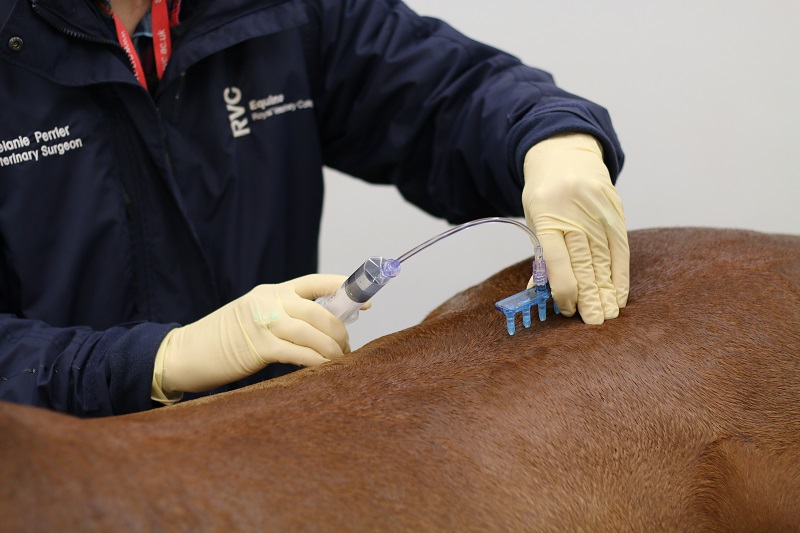Equine Sports Medicine and Rehabilitation Services
Clinical Connections – Autumn 2018
The RVC Equine team provides a wide range of therapeutic support for performance and leisure horses. We interviewed Dr Melanie Perrier, a Lecturer in Equine Surgery and a certified equine rehabilitation practitioner. She has 14 years’ experience providing equine sports medicine and rehabilitation services – gained in the USA, the Middle East and France, as well as the UK. Melanie and her team work closely with colleagues across a number of areas including Hertfordshire, Kent, Sussex and Essex.
How long has you worked at RVC Equine and what brought you here? I joined the RVC in May 2017 because I wanted to part of a team applying advanced and innovative techniques to ensure the best patient outcomes.
What do you like most about working in this environment? I like the true multidisciplinary approach to equine health. We pull together diagnostic expertise, best practice treatments and apply findings of our wider research to achieve optimum outcomes.
What type of conditions do you treat? The applications are wide ranging from surgical and orthopaedic cases to tackling poor performance issues. In surgical or trauma cases, we use of variety of techniques so we address issues such as pain control, oedema reduction, scar tissue reduction and neuronal regeneration.
How is RVC expertise applied to performance horses? We can play a key role in managing a performance horse back to health. We are very mindful of compliance with prohibited substance policies. We apply and measure results of a variety of treatments to ensure the delicate balancing act of rehabilitation and compliance is maintained.
Sports Medicine and Rehabilitation Services
- Acupuncture
- Mesotherapy
- Stem cell therapy
- Overground endoscopy
- Sensor evaluation for lameness
- C1 equine nerve grafts
How do you work with the RVC’s equine stem cell service? The RVC pioneered this research area and we have several years of experience in this domain. We are fortunate to have a regenerative therapy laboratory here on site. This allows us to process bone marrow aspirate for culture of stem cells. After cultivation, these stem cells can be injected into tendinous lesions for example, in order to try to enhance the healing process. We would typically use this in tendinopathies and desmopathies but also in joint disorders.
Tell us about the new service you offer - mesotherapy It consists of multiple intradermal injections of a mixture of highly diluted drugs, using a linear injector and fine needles over painful areas. The length of the needle is important. It has been shown that, to be most effective, injections should not be given at a depth greater than 4mm. It’s based on gait control pain principles and the concept of meso-interface (the more fragmented the substance injected, the greater the number of dermal receptors activated). It is particularly effective for managing back and neck pain.
Does mesotherapy have any side effects? The procedure will leave small bumps over the injected region which disappear in a few days. Very few adverse reactions are reported. Risk of infection at the injection site is always a factor so sterile principles should be applied when performing mesotherapy. It is also recommended not to wash the horse nor put a rug on for 24-48 hours following the procedure to limit risks of reaction at the injection site. Most of the horses will show some clinical response in five to seven days following treatment. The number of treatments needed depends upon the severity of the problem and also varies between patients.

To make an equine referral, please call 01707 666297 Email: Equinereception@rvc.ac.uk
